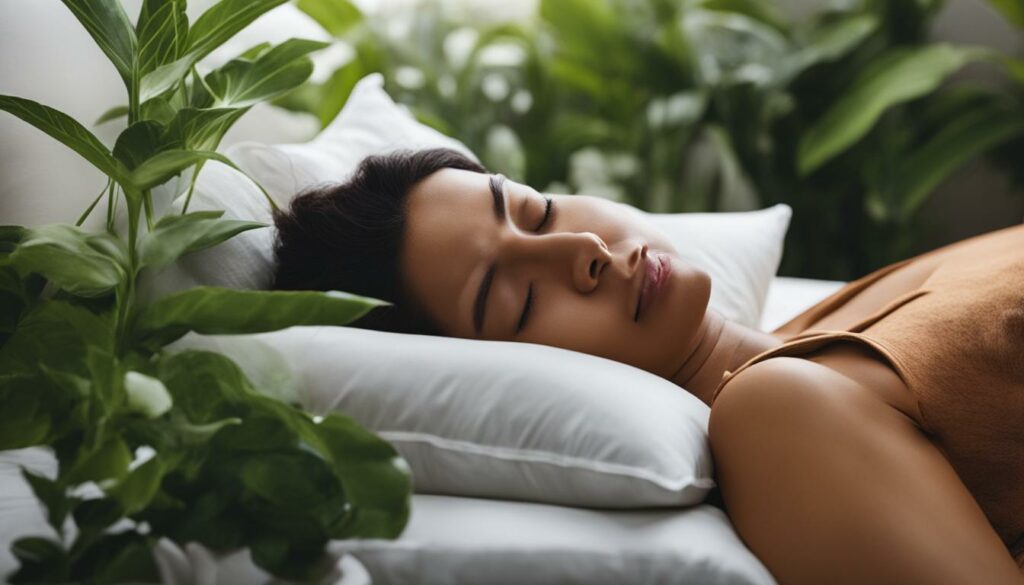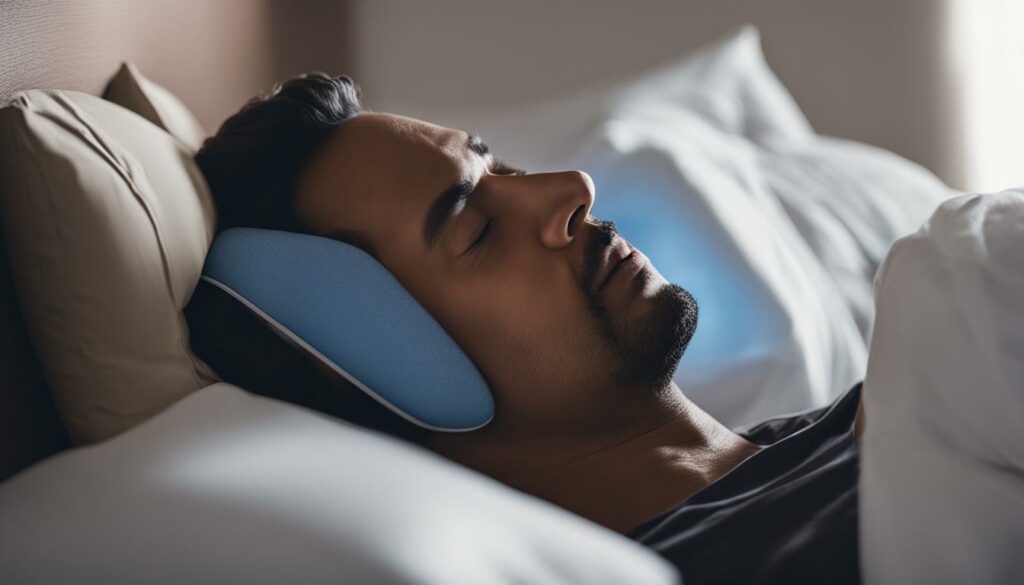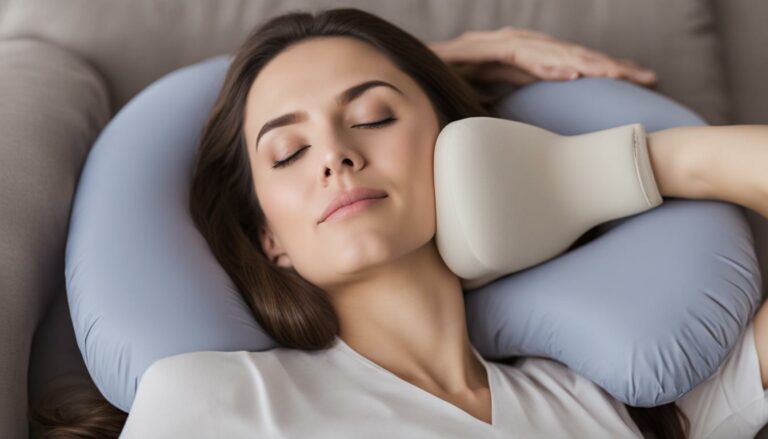Wedge Pillow for Snoring: Usage Tips for Quiet Nights
Eric Christie stands as a luminary in the bedding industry, with a career spanning nearly four decades since the early 1980s. His journey through the world of bedding has seen him wear many hats – a manufacturer, designer, and retailer, showcasing his versatility and expertise in Read more...
pillowsandbedsheets.com and its partners may earn a commission if you purchase a product through one of our links
If you or your partner snores, you know how disruptive it can be to a good night’s sleep. The constant noise can leave you feeling tired and irritable the next day. But there is a solution – a wedge pillow for snoring. This simple yet effective tool can help improve your sleep quality and reduce snoring naturally.
A wedge pillow is designed to elevate your upper body, providing proper support to your head and neck. By doing so, it helps keep your airways open and reduces the vibrations that cause snoring. Using a wedge pillow for snoring is a sleep therapy technique that has been proven to be beneficial for many individuals.
In this article, we will explore how to use a wedge pillow for snoring and the benefits it offers. We will also discuss sleep positions for snoring, other snoring remedies, and the importance of addressing snoring for your overall well-being. By the end, you’ll have a better understanding of how a wedge pillow can help you achieve quiet, restful nights.
Key Takeaways:
- Using a wedge pillow for snoring can improve your sleep quality and reduce snoring naturally.
- A wedge pillow elevates your upper body, keeping your airways open and reducing snoring vibrations.
- Proper sleep positions, lifestyle changes, and other snoring remedies can complement the use of a wedge pillow.
- Addressing snoring is important for your overall well-being, as it can impact your sleep quality and relationships.
- By incorporating a wedge pillow into your sleep routine, you can enjoy quieter and more restful nights.
What is Snoring?
Snoring is a common sleep-related phenomenon that affects millions of people worldwide. It is the loud breathing noise made during sleep and is often caused by relaxed muscles and soft tissue in the throat. When these muscles and tissues vibrate, they produce the characteristic snoring sound that can be disruptive to a peaceful night’s rest.
Snoring can have various effects on both the snorer and their partner. For the snorer, it can lead to interrupted sleep patterns, resulting in daytime fatigue, difficulty concentrating, and irritability. The partner of a snorer may also experience sleep disturbances, leading to similar symptoms and potential strain on their relationship.
In some cases, snoring may be more than just a nuisance; it could be a sign of a more serious sleep disorder called sleep apnea. Sleep apnea is characterized by breathing interruptions during sleep, which can significantly impact overall health and wellness if left untreated.
Understanding the causes, effects, and potential links between snoring and sleep apnea is crucial in finding appropriate treatment strategies. By addressing snoring and its underlying causes, individuals can take steps towards improving their sleep quality and overall well-being.
| Snoring Definition | Snoring Effects | Snoring and Sleep Apnea |
|---|---|---|
| Snoring refers to the loud breathing noise made during sleep. | Snoring can lead to interrupted sleep for both the snorer and their partner. | Snoring may be an indication of sleep apnea, a sleep disorder characterized by breathing interruptions during the night. |
| Snoring is caused by relaxed muscles and soft tissue in the throat. | Snoring can result in daytime fatigue, difficulty concentrating, and irritability. | Sleep apnea can have significant health implications if left untreated. |
Common Causes of Snoring
Snoring is a common issue that can disrupt sleep and affect both you and your partner. Understanding the underlying causes of snoring is crucial in finding effective treatment options. Several factors can contribute to snoring, including:
- Blocked nasal passages: When your nasal passages are congested or blocked, airflow can be restricted, leading to snoring.
- Deviated septum: If the wall between your nostrils (the septum) is crooked or deviated, it can obstruct airflow and contribute to snoring.
- Tongue obstruction: When the tongue falls back into the throat during sleep, it can block the airway and result in snoring.
- Sleep apnea: Snoring can also be a symptom of sleep apnea, a sleep disorder characterized by repetitive pauses in breathing during sleep.
In addition to these specific causes, there are also risk factors that can increase the likelihood of snoring. These include obesity, smoking, and certain medications. Excess weight can lead to fatty tissue in the throat, narrowing the airway and causing snoring. Smoking irritates the airways and can lead to inflammation and increased snoring. Certain medications, such as sedatives or muscle relaxants, can also relax the throat muscles, contributing to snoring.
Identifying the specific cause of your snoring is important as it can help guide the appropriate treatment options. Whether it’s addressing blocked nasal passages, seeking treatment for a deviated septum, or managing sleep apnea, understanding the root cause allows for targeted interventions.

Sleep Position and Snoring
Sleep position can play a significant role in snoring. The way you sleep can affect the airway and contribute to snoring or alleviate it. Understanding the best sleep position for snoring prevention can help you have a quieter night’s sleep.
Sleeping on your back is a common posture that can worsen snoring. When you lie on your back, gravity pulls the tongue and soft tissues into the airway, causing vibrations and creating the snoring sound. If you or your partner snore, avoiding back sleeping can be beneficial.
Side sleeping is often recommended for snoring relief. By sleeping on your side, you help keep the airway open and reduce the likelihood of snoring. This position lessens the chance of tongue and throat muscles relaxing and blocking the air passages. Additionally, side sleeping can reduce the severity of sleep apnea, a condition often associated with snoring.
To encourage side sleeping and further prevent snoring, you can consider using positional therapy. There are various positional therapy devices available, such as anti-snoring pillows or wearable devices, that help you maintain a side sleeping position throughout the night. These devices work by providing gentle reminders or support to keep you on your side, reducing snoring frequency.
It’s important to find a sleep position that suits your comfort while addressing snoring concerns. Experimenting with different sleep positions and utilizing positional therapy can help you discover what works best for you in reducing snoring and promoting better sleep quality.
Benefits of Side Sleeping for Snoring Prevention
Sleeping on your side offers several benefits for snoring prevention:
- Keeps the airway open
- Reduces the likelihood of tongue and throat muscles blocking the air passages
- May improve sleep apnea symptoms
- May result in quieter nights for both you and your partner

Sleep Positions and Snoring Prevention
| Sleep Position | Effect on Snoring |
|---|---|
| Back Sleeping | Worsens snoring due to gravity pulling the tongue and soft tissues into the airway |
| Side Sleeping | Alleviates snoring by keeping the airway open and reducing the likelihood of tongue and throat muscle obstruction |
How to Use a Wedge Pillow for Snoring
A wedge pillow is a specially designed pillow that can help alleviate snoring by promoting proper sleep positioning. Using a wedge pillow for snoring can provide several benefits, including reducing snoring frequency and improving sleep quality. Here’s a step-by-step guide on how to use a wedge pillow effectively:
- Choose the Right Pillow: Select a wedge pillow that suits your needs. Consider the height and firmness of the pillow to ensure comfort and effectiveness. Ideally, choose a pillow with a gradual incline that elevates the upper body to promote optimal airway alignment.
- Position the Pillow: Place the wedge pillow on your bed in an upright position, with the wider end facing down and the narrower end supporting your upper body. The pillow should be positioned under your back and extend up to support your head and neck.
- Elevate Your Upper Body: Lie down on the wedge pillow, positioning your upper body comfortably on the elevated surface. The pillow should elevate your head and neck, keeping them slightly above your stomach. This helps prevent the collapse of the airway, reducing snoring.
- Adjust to Find Optimal Comfort: Take some time to find the most comfortable position on the wedge pillow. You may need to make slight adjustments or try different positions to achieve optimal comfort and effectiveness.
- Combine with Other Snoring Remedies: For enhanced results, you can combine the use of a wedge pillow with other snoring remedies and lifestyle changes. These may include nasal congestion relief, breathing exercises, weight loss, and avoiding alcohol before bedtime.
Using a wedge pillow for snoring can be an effective and non-invasive way to improve sleep quality and reduce snoring. By promoting proper sleep positioning, the wedge pillow helps keep the airway open, reducing the vibrations that cause snoring. Incorporating a wedge pillow into your sleep therapy routine can contribute to quieter nights and better overall sleep.
| Benefits of Using a Wedge Pillow for Snoring |
|---|
| Elevates the upper body to promote proper sleep positioning |
| Reduces snoring frequency and intensity |
| Improves airflow and prevents airway collapse |
| Enhances sleep quality for both the snorer and their partner |
| Non-invasive and natural snoring solution |
Other Snoring Remedies
In addition to using a wedge pillow, there are several other remedies that can provide relief from snoring. These remedies target specific factors that contribute to snoring, such as nasal congestion, poor breathing patterns, and lifestyle habits. By incorporating these remedies into your routine, you can significantly reduce the frequency and intensity of snoring episodes.
Nasal Congestion Relief
Nasal congestion can worsen snoring by obstructing the airways. To alleviate nasal congestion, you can try:
- Using saline nasal sprays or rinses to clear the nasal passages.
- Using over-the-counter nasal decongestants for temporary relief.
- Using nasal strips that help open up the nasal passages for improved airflow.
Breathing Exercises
Practicing breathing exercises can help strengthen the muscles involved in breathing and reduce snoring. Consider trying:
- Deep breathing exercises to improve lung capacity and promote proper breathing patterns.
- Tongue and throat exercises to target specific muscles that contribute to snoring.
- Yoga or meditation techniques that promote relaxation and alleviate stress, which can impact breathing patterns.
Lifestyle Changes
Adopting certain lifestyle changes can have a significant impact on snoring. Consider the following:
- Weight loss: Shedding excess weight can reduce fatty tissue in the throat, which can contribute to snoring.
- Smoking cessation: Smoking irritates the airways and can lead to inflammation, making snoring more likely. Quitting smoking can improve overall respiratory health.
- Diet modification: Avoid consuming heavy meals or alcohol close to bedtime, as these can relax the muscles and worsen snoring.
Remember, consistency is key when it comes to seeing results from these remedies. Incorporate them into your daily routine and be patient, as it may take time for the effects to become noticeable.
By combining the use of a wedge pillow with these remedies, you can optimize your snoring relief efforts and enjoy quieter nights of restful sleep.
Comparison of Snoring Remedies
| Remedy | Key Benefits |
|---|---|
| Nasal Strips | Helps open up nasal passages for improved airflow |
| Breathing Exercises | Strengthens breathing muscles and improves breathing patterns |
| Weight Loss | Reduces fatty tissue in the throat, reducing snoring likelihood |
| Smoking Cessation | Improves respiratory health and reduces airway irritation |
Remember, it’s important to consult with a healthcare professional if snoring persists or worsens, as it could be a sign of an underlying sleep disorder such as sleep apnea. They can provide further guidance and treatment options tailored to your specific needs.

Sleep Apnea and Snoring Treatment
Snoring can sometimes be a symptom of sleep apnea, a serious sleep disorder. If you experience snoring along with gasping or choking sounds, excessive daytime sleepiness, or other concerning symptoms, it is crucial to seek medical evaluation for sleep apnea diagnosis. Identifying and treating sleep apnea is essential for improving overall health and quality of life.
Treatments for sleep apnea vary depending on the severity of the condition. Here are some commonly recommended options:
- Continuous Positive Airway Pressure (CPAP) Therapy: CPAP therapy involves wearing a mask over the nose or nose and mouth during sleep. The mask delivers a constant stream of air pressure, keeping the airway open and preventing pauses in breathing.
- Oral Appliances: Oral appliances are custom-fitted devices that help keep the airway open by repositioning the jaw or tongue. These appliances are typically used for mild to moderate sleep apnea cases.
- Surgical Options: In some cases, surgical interventions may be necessary to treat sleep apnea. The specific surgical procedures vary and can include removing excess tissue in the throat, correcting structural abnormalities, or implanting devices to help maintain airway patency.
It is essential to consult with a healthcare professional who specializes in sleep disorders to determine the most suitable treatment approach for your specific condition.
Comparison of Sleep Apnea Treatment Options:
| Treatment Option | Description | Pros | Cons |
|---|---|---|---|
| Continuous Positive Airway Pressure (CPAP) Therapy | Air pressure delivered through a mask worn during sleep to keep the airway open. |
|
|
| Oral Appliances | Custom-fitted devices that reposition the jaw or tongue to keep the airway open. |
|
|
| Surgical Options | Variety of surgical procedures to address structural abnormalities or remove excess tissue. |
|
|
It is important to consult with a sleep specialist to determine the most suitable treatment option based on the severity of your sleep apnea, your individual needs, and overall health.

Importance of Sleep Quality
When it comes to the impact of snoring, sleep quality plays a vital role in overall well-being. Sleep deprivation caused by snoring can lead to a range of health issues and affect various aspects of your life.
The Health Effects of Poor Sleep
Poor sleep quality due to snoring can result in sleep deprivation, which has numerous detrimental effects on your health. Lack of sufficient sleep can weaken the immune system, impair cognitive function, and increase the risk of developing chronic conditions such as heart disease, diabetes, and obesity.
It’s important to prioritize quality sleep to maintain optimal physical and mental health. Addressing snoring and improving sleep quality can significantly mitigate these health risks.
Relationship Impact of Snoring
Snoring not only affects the snorer but also their partner. The disruptive noise can lead to disturbed sleep patterns, resulting in fatigue, irritability, and resentment. Over time, this strain can take a toll on the relationship, leading to communication issues and decreased intimacy.
Daytime Sleepiness and Cognitive Function
One of the most common consequences of sleep deprivation caused by snoring is daytime sleepiness. Insufficient sleep can leave you feeling tired, groggy, and less focused throughout the day. This can significantly impact your productivity, performance at work or school, and overall quality of life.
Furthermore, impaired cognitive function, difficulty concentrating, and memory problems are common when sleep quality is compromised due to snoring.
Improving Sleep Quality for Better Health
Addressing snoring and improving sleep quality can have wide-ranging benefits for your physical and mental well-being. By implementing effective snoring relief strategies, such as using a wedge pillow or exploring other remedies, you can enjoy more restful nights, enhanced cognitive function, improved mood, and reduced health risks associated with poor sleep.
Investing in your sleep health by prioritizing effective snoring solutions is a proactive step towards overall wellness and better quality of life.
Section 8 Table Title: The Impact of Snoring on Sleep Quality and Health
| Effects of Snoring on Sleep Quality | Effects of Poor Sleep on Health |
|---|---|
| Daytime sleepiness | Increased risk of chronic diseases |
| Disrupted sleep patterns | Weakened immune system |
| Strained relationships | Impaired cognitive function |
| Decreased cognitive function | Greater susceptibility to weight gain |
Conclusion
Snoring is a common issue that can disrupt your sleep and strain relationships. If you’re looking for snoring solutions to enjoy quiet nights and improve the quality of your sleep, using a wedge pillow can be highly beneficial. By elevating your upper body and promoting proper sleep positions, a wedge pillow can help alleviate snoring and enhance your overall sleep experience.
However, it’s important to note that a wedge pillow is just one aspect of a comprehensive approach to snoring relief. In addition to using a wedge pillow, addressing underlying causes such as nasal congestion and adopting healthy lifestyle habits can contribute to better results. Consider techniques like nasal congestion relief, nasal strips, breathing exercises, weight loss, and smoking cessation.
Remember, consistently practicing these remedies and making positive changes can greatly improve your sleep quality and mitigate the disruptive effects of snoring. Prioritize your sleep health, explore the benefits of a wedge pillow, and take proactive steps towards achieving quiet and restful nights for you and your loved ones.
FAQ
How can a wedge pillow help with snoring?
A wedge pillow can elevate the upper body and promote a proper sleep position, reducing snoring by preventing the tongue and soft tissues from blocking the airway.
What causes snoring?
Snoring is caused by relaxed muscles and soft tissue in the throat, which can be influenced by factors such as blocked nasal passages, a deviated septum, tongue obstruction, or sleep apnea.
Does sleep position affect snoring?
Yes, sleeping on your back can worsen snoring as gravity pulls the tongue and soft tissues into the airway. Side sleeping can help alleviate snoring by keeping the airway clear.
How do I use a wedge pillow for snoring?
To use a wedge pillow for snoring, place it under your upper body to elevate your head and neck. It’s important to choose the right height and firmness for optimal comfort and effectiveness.
Are there other remedies for snoring?
Yes, in addition to using a wedge pillow, you can try relieving nasal congestion, using nasal strips, practicing breathing exercises, making lifestyle changes like weight loss and smoking cessation, and avoiding alcohol and certain medications before bedtime.
Is snoring always a sign of sleep apnea?
While snoring can be a symptom of sleep apnea, it does not always indicate the presence of this sleep disorder. If you have other symptoms like gasping or choking sounds during sleep or excessive daytime sleepiness, you should consult a medical professional for an evaluation.
How does snoring affect sleep quality?
Snoring can disrupt sleep for both the snorer and their partner, leading to decreased sleep quality, daytime sleepiness, impaired cognitive function, and negative impacts on overall health.
Eric Christie stands as a luminary in the bedding industry, with a career spanning nearly four decades since the early 1980s. His journey through the world of bedding has seen him wear many hats – a manufacturer, designer, and retailer, showcasing his versatility and expertise in Read more...







